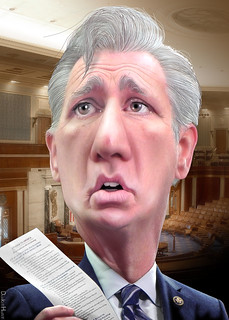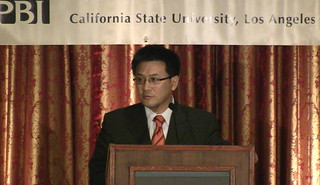 Potential new majority leader not normally in step with his home state’s leadership
Potential new majority leader not normally in step with his home state’s leadership
Kevin McCarthy looks all but assured of assuming Eric Cantor’s old job as Majority Leader in the House. Raul Labrador is having troubles controlling his own state’s convention, let alone trying to wrangle votes for leadership, and there don’t appear to be any viable challengers. So, it appears that is just a matter of time until both the Majority and Minority Leaders are Californians.
Now, you might think that awesome for California. We’ll be flush with federal dollars for infrastructure and other development. Well, you may want to hold that thought. McCarthy is a Republican. In 2014. That means he must act like all federal programs are ridiculous and that states are awesome. Except California and our San Francisco values.
As I noted on the budget post below, McCarthy has been on the harshest HSR critics for years now. He does not like the project for a multitude of reasons. The cynical would say that it may have something to do with his overall chumminess with energy companies. And if you look at his energy policy, you won’t find too many disagreements with Big Oil. But if you ask him, it is about funding and protecting the California and federal budgets.
He aimed most of his ire at the bullet train project, which would receive $250 million in the next fiscal year and in subsequent years. The funds are 25% of revenues from the state’s cap-and-trade program, which collects fees on polluters.
“Time and again, the high-speed rail boondoggle has proven to be an unfeasible project that will put undue and damaging pressure on our state budget, ultimately hurting taxpayers,” McCarthy said in a statement. (LAT)
There area a multitude of other issues where he disagrees with a majority of the state. On water, he is hard-core in the agricultural corner, a stalwart for the farmers over fish people. And that isn’t really surprising considering his district. It is a strong GOP district, with Obama not managing to break 40% in either election.
But there are some other dynamics to his district. Check these demographics:
Race: 75.8% White, 6.8% Black, 5.2% Asian, 1.4% American Indian (National Percentages: 72.4% White, 12.6% Black, 4.8% Asian, 0.9% American Indian)
Ethnicity: 64.6% Non-Hispanic, 35.4% Hispanic (National Percentages: 83.6% Non-Hispanic, 16.4% Hispanic) (Politics USA)
McCarthy has never been hard line anti-immigrant. To be honest, it is hard to find a big difference on that front from Cantor. As he has a large farmworker population, and many large agricultural operations that rely on them, he is in a tough position with his more reactionary colleagues when he has support like this:
“There is no reason for Congressman Kevin McCarthy, as leader, not to take leadership on this issue,” said immigration reform activist Arturo Rodriguez, president of United Farm Workers. “Everyone will expect it and demand it. And we will step up all of our activities as a whole.” (CNN)
But McCarthy is a smart man. You don’t move up the ladder as quickly as he has if that wasn’t true. He sees the math, and understand the Republican predicament if they keep turning off Latino voters. In a district like his own, it would be hard to miss.
A few years ago, we thought we would have a great opportunity for reform. Republicans like Cantor and Boehner knew that the party had to change on the issue, or would continue to haunt them. But with Brat’s win over Cantor, will McCarthy continue to press the issue?
“I think his (McCarthy’s) views on immigration are similar to Cantor’s,” said Steven Camarota, director of research for the non-profit Center for Immigration Studies. “But after this week’s results, it seems much less likely he would push it. And even less likely still that he would move his members to push it.” (CNN
But McCarthy is capable of building coalitions, sometimes despite his own party’s reluctance. If he is willing to work with Boehner and Democrats, he could probably muster the votes. The question is how he deals with his own members. It is a question of threading a very, very fine needle. But it is a needle that he, and his party, need to thread. Electorally, Democrats would be better if he didn’t, but clearly comprehensive immigration reform would be the right course for the nation.
But on the plus side, he frequently says funny/incomprehensible things, so there’s that.





